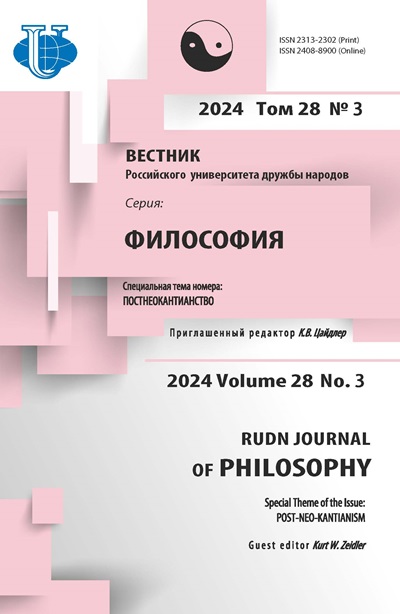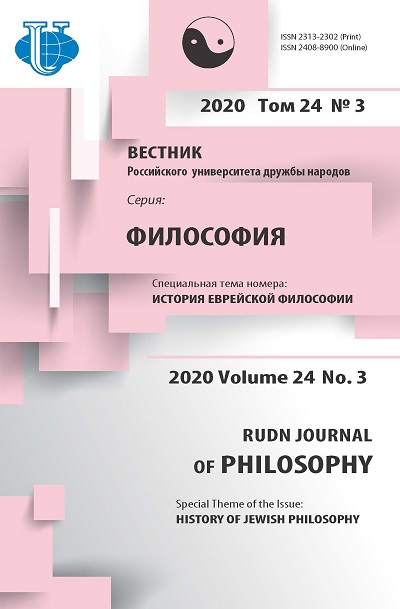Idea of Time in Bergson’s Lectures
- Authors: Menshikov A.S.1
-
Affiliations:
- Ural Federal University
- Issue: Vol 24, No 3 (2020): HISTORY OF JEWISH PHILOSOPHY
- Pages: 432-444
- Section: PHILOSOPHY OF LIFE AND EXISTENTIAL PHILOSOPHY
- URL: https://journals.rudn.ru/philosophy/article/view/24356
- DOI: https://doi.org/10.22363/2313-2302-2020-24-3-432-444
Cite item
Full Text
Abstract
The article focuses on two lecture courses - “The Idea of time” and “The History of the Idea of Time” - delivered by the French philosopher Henri Bergson at Collège de France in 1901-1903. While these courses cannot replace Bergson’s published works for understanding his philosophy, they can shed new light on Bergson’s popularity. Due to the requirements of the genre, Bergson presents his views in a most succinct and convincing manner and showcases his most original ideas. In these lectures Bergson reinterprets traditional philosophical categories such as the absolute and the relative, the infinite and the finite, and explores two major modes of cognition - conceptual and intuitive knowledge. Major thrust of Bergson’s arguments is targeted at conceptual cognition because it is incapable of grasping the duration. Conceptual cognition relies on signs to operate representations of reality. Bergson demonstrates that signs, including concepts, are general, fixating and they appeal to action. Conceptual cognition, therefore, is based on fragmenting continuous processes in reality. However, when discussing intuitive cognition Bergson provides but an outline by referring to “intellectual sympathy”, “plunging into the thing in itself”. Despite this apophatic description of the alternative - intuitive - mode of cognition Bergson insists on fundamental transformation of philosophy. We conclude that already in the early 1900s Bergson has in mind an entire project of reconstituting metaphysics and reorienting it towards the problem of time, what might be described as “temporal turn” in philosophy of the twentieth century.
Keywords
About the authors
Andrey Sergeevich Menshikov
Ural Federal University
Author for correspondence.
Email: asmenshikov@urfu.ru
Cand.Sc. in Philosophy, Associate professor at the Department of Philosophy
Mira 19, Ekaterinburg, Russian Federation, 620002References
- Soulez P, Worms F. Bergson. Biographie. Paris: Flammarion; 1997.
- Canales J. The Physicist and the philosopher. Einstein, Bergson, and the debate that changed our understanding of time. Princeton: Princeton University Press; 2015.
- Deleuze G. Le Bergsonisme. Paris: PUF; 1966.
- Guerlac S. Thinking in Time: Henri Bergson (An Interdisciplinary Conference). MLN — Modern Language Notes. 2005; 120(5):1091—1098. Available from: https://www.jstor.org/stable/3840698.
- Kumar ShK. Bergson and the stream of consciousness novel. NY: New York University Press; 1963.
- Douglass P. Bergson, Eliot, and American literature. Lexington: University Press of Kentucky; 1986.
- Gillies MA. Henri Bergson and British modernism. Montreal: McGill-Queen’s University Press; 1996.
- Fink HL. Bergson and Russian Modernism, 1900—1930. Evanston: Northwestern University Press; 1999.
- Latta C. When the eternal can be met. The Bergsonian theology of time in the works of C.S. Lewis, T.S. Eliot, and W.H. Auden. Eugene, Oregon: Pickwick publications; 2014.
- Ardoin P, Gontarski SE, editors. Understanding Bergson, Understanding Modernism. London: Bloomsbury; 2013.
- Mullarkey J. Bergson and philosophy. Edinburgh: Edinburgh University press, 2000.
- Guerlac S. Thinking in time. An introduction to Henri Bergson. New York: Cornell University Press, 2006.
- Lefebvre A, White M, editors. Bergson, politics, and religion. Durham & London: Duke University Press, 2012.
- Ansell-Pearson K. Bergson. Thinking beyond the human condition. New York: Bloomsbury, 2018.
- Massey H. The origin of time. Heidegger and Bergson. Albany: State University of New York Press; 2015.
- Blauberg II. Anri Bergson. Moscow: Progress—Tradicija, 2003. 672 p. (In Russian).
- Riquier C. Présentation. In: Bergson H. Histoire de l’idée de temps. Cours au Collège de France, 1902—1903. Paris: PUF; 2016. Р. 7—16.
- Meyer-Bisch G. Présentation. In: Bergson H. L’idée de temps. Cours au Collège de France, 1901—1902. Paris: PUF; 2019. P. 7—13.
- Bergson H. L’idée de temps. Cours au Collège de France, 1901—1902. Paris: PUF, 2019.
- Bergson H. Histoire de l’idée de temps. Cours au Collège de France, 1902—1903. Paris: PUF; 2016.
- Soboleva ME. Vremja kak smysl i smysl kak vremja: O transcendental'nyh osnovanijah vremeni. Izvestija UrFU. Serija 3 — Obshhestvennye nauki. 2019; 14(3(191)): 52—63. (In Russian).
















